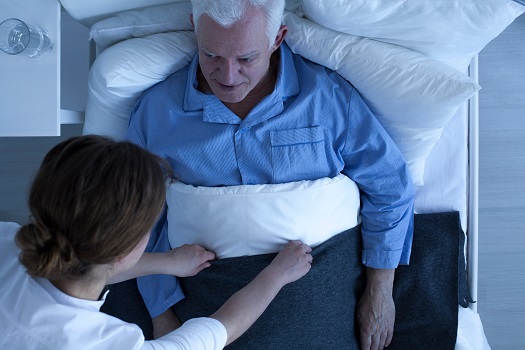Incontinence is a rather common problem for seniors, particularly during the evening hours. While incontinence can stem from various causes, including medication side effects, dementia, and a natural weakening of the pelvic muscles, it can be frustrating for seniors and those who provide care for them. Here are a few strategies that can be implemented to help seniors address issues of nighttime incontinence.
Look to the Routine
Having a nightly toileting routine can help with incontinence, but adjustments may be needed for it to be effective. Let’s say Mom or Dad goes to the restroom, takes a bath, and then goes to bed but the sheets are wet in the morning. This may be because of the timing of the bath. The soothing effects of bathing can stimulate the bladder muscles. This is common in seniors with limited mobility as well as those who must be turned in their beds on a regular basis. When providing care for a loved one with incontinence issues, toileting may need to be offered again after bathing or other activities.
If your elderly loved one is living with a serious medical condition and needs help managing the tasks of daily living, reach out to Home Care Assistance, an in-home care agency you can trust. Our caregivers are available 24/7, there are no hidden fees in our contracts, and we offer a 100% satisfaction guarantee on all of our in-home care services.
Change the Timing of Medications
Some medications can be the source of the problem. For example, diuretics, also known as “water pills,” are typically given to seniors in the morning to prevent frequent urination at night. However, a diuretic may not always be to blame. Medicines that cause urinary retention can prevent seniors from fully emptying their bladders, leading to accidents during the nighttime hours. Medications that cause increased thirst can have the same effect and shouldn’t be given to seniors late in the afternoon or evening. When incontinence is an issue for your loved one, talk to his or her doctor about changing the timing of prescribed medications.
Urinary incontinence is just one of the many health issues older adults are susceptible to. Seniors can face a variety of challenges as they age, many of which can be mitigated with the help of professional in-home caregivers who provide high-quality senior home care. Barrie families trust Home Care Assistance to help their elderly loved ones age in place safely and comfortably.
Consider Fluid Intake
Decreasing fluid intake after a certain time in the evening may prevent nighttime incontinence, but this isn’t something family caregivers should start doing without careful consideration. Seniors are more prone to dehydration than people in other age groups, and taking away fluids is never recommended. If the fluids can be replaced earlier in the day, it may be possible to decrease intake after a certain time at night.
Incontinence is a serious health concern that could impact your loved one’s ability to manage everyday activities independently. Every senior has different needs when aging in place. Some simply need occasional assistance with household chores, while others may be managing serious illnesses and require more extensive live-in care. Barrie seniors can count on Home Care Assistance to provide the in-home care they need and deserve. Call one of our friendly Care Managers today at 647-970-3803 to learn more about our customized care plans.
